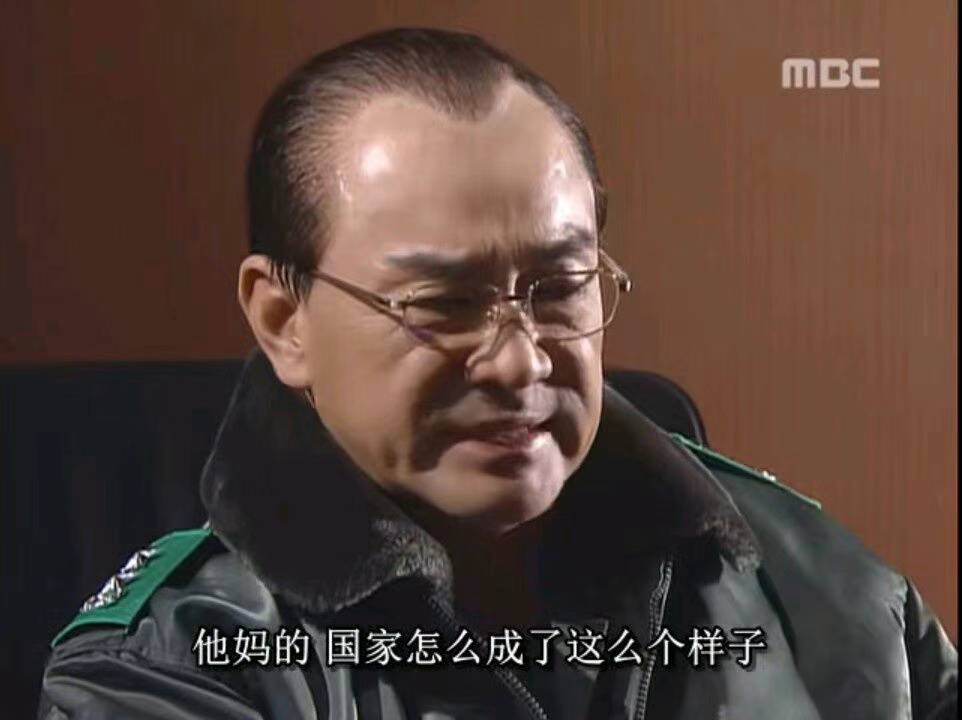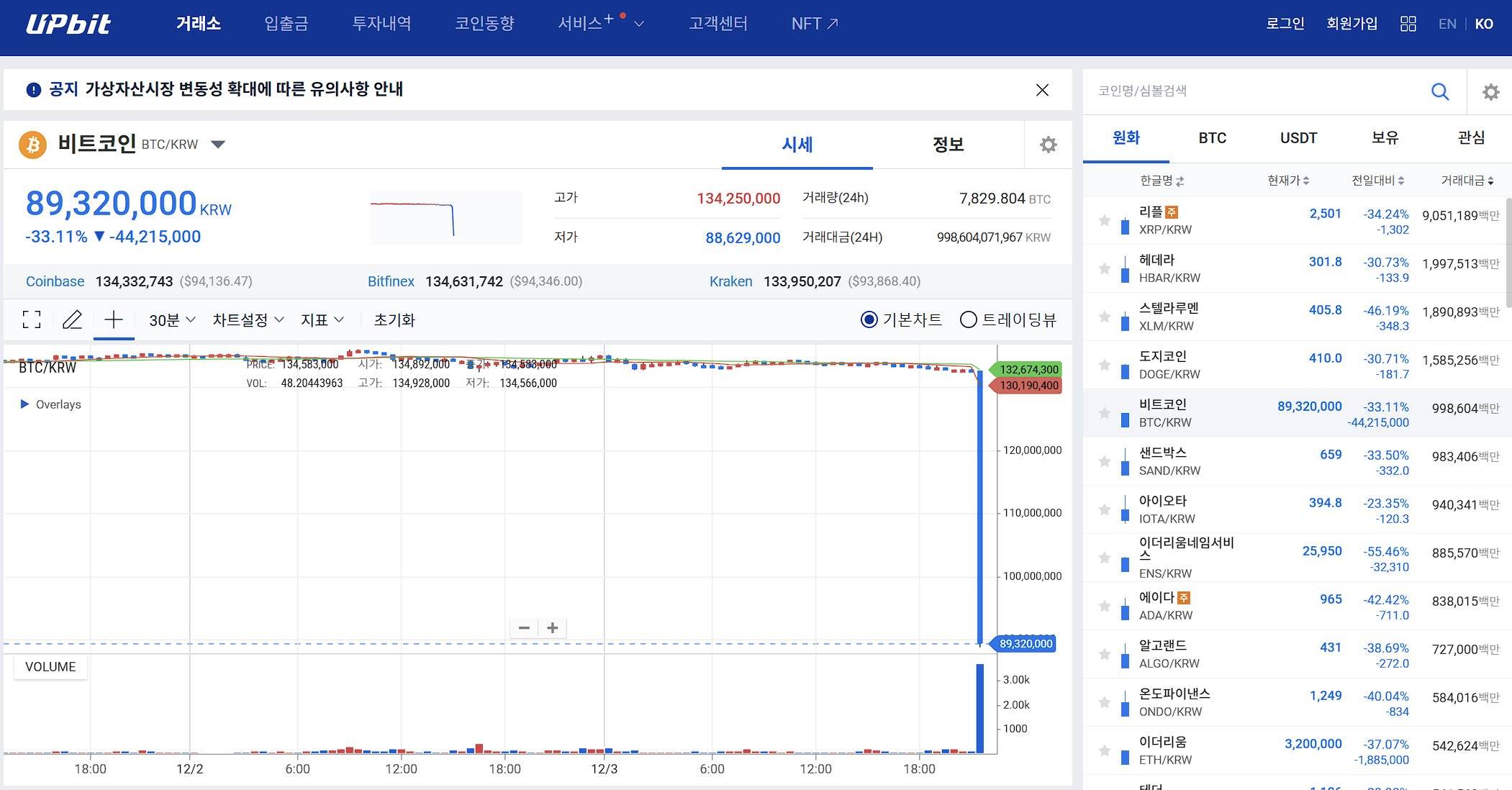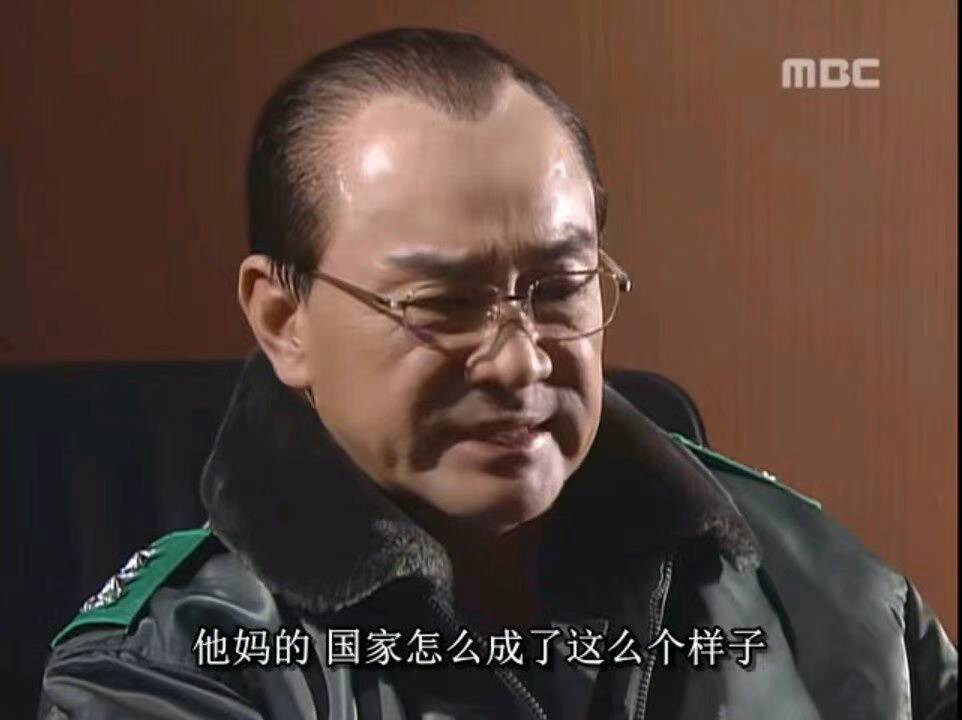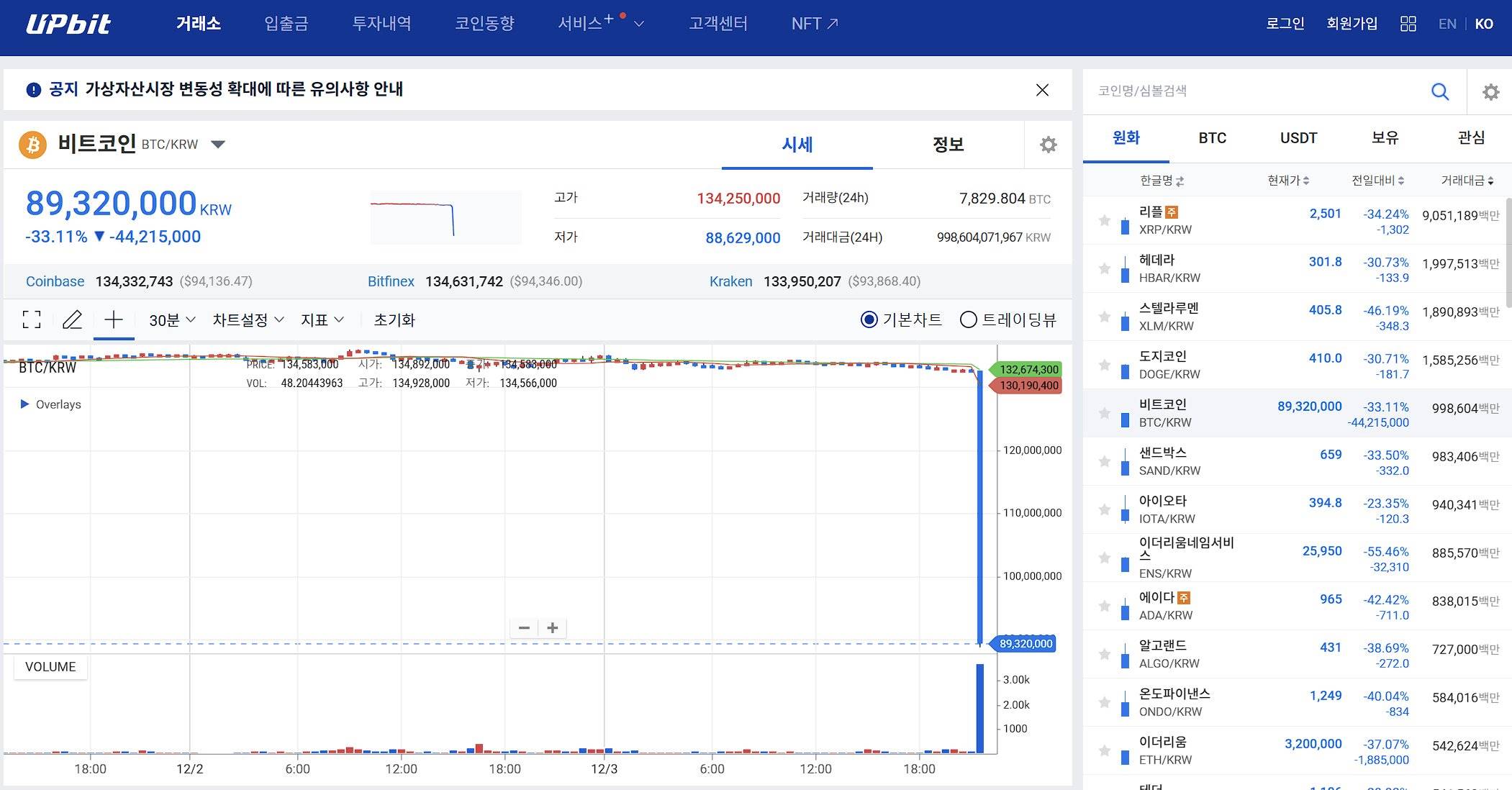

On December 3, 2024, South Korean President Yoon Suk-yeol unexpectedly announced the implementation of "emergency martial law," a decision that not only shocked the South Korean political scene but also triggered a severe constitutional crisis.
As always, the ones hurt are the cryptocurrency investors, as the price of Bitcoin on Korea's largest exchange, Upbit, briefly plunged to 65 thousand USD.

So, the question arises, why did Yoon Suk-yeol announce the sudden martial law?
The direct reason Yoon Suk-yeol announced martial law was to "maintain the order of freedom and constitutional governance," accusing the opposition party of "hijacking the National Assembly and disturbing the nation," stating the need to protect the Republic of Korea from the threats of North Korean communist forces and to eradicate pro-North anti-state forces.
Who is the enemy he refers to?
That would be Lee Jae-myung, Yoon Suk-yeol's lifelong political rival.
In South Korea's political arena, the rivalry between Yoon Suk-yeol and Lee Jae-myung has become one of the most notable political dramas in recent years. This feud, which began with the prosecution system, continued through the presidential election, and ultimately evolved into judicial accountability, is not just a personal rivalry between two political figures but also reflects the deep divisions within South Korean society.
In 2019, then-Prosecutor General Yoon Suk-yeol began a series of investigations into the ruling Democratic Party. At that time, Lee Jae-myung, who was serving as the governor of Gyeonggi Province, also became one of the targets of the prosecution's attention. This rivalry reached its peak during the 2022 presidential election, where the two engaged in intense confrontations during the campaign, revealing each other's family corruption and spousal issues. Ultimately, Yoon Suk-yeol won by a narrow margin and took office in the Blue House.
Although Lee Jae-myung lost the 2022 presidential election by a narrow margin, his political influence has not diminished.
The dramatic turn of events in 2023 added more fuel to this feud. In March, Lee Jae-myung was charged with multiple offenses, including corruption in urban development, illegal remittances to North Korea, and perjury during the election period. By September, he was officially arrested, which immediately sparked strong protests from his supporters.
Supporters of Lee Jae-myung believe this is Yoon Suk-yeol's government's blatant political retaliation. Meanwhile, the ruling party insists that it is acting according to the law, emphasizing the independence and necessity of judicial procedures. This controversy quickly evolved into a nationwide political crisis, sparking waves of protests on the streets of Seoul.
Why does Lee Jae-myung, despite being embroiled in multiple lawsuits, still garner substantial public support?
We must talk about Lee Jae-myung's life; his rise can be likened to South Korea's version of the "American Dream."
Coming from a poor background, his father was an ordinary miner, and the family was not well off. More notably, he did not possess a prestigious educational background like many of South Korea's political elites, instead passing the bar exam through self-study and making a mark in the field of human rights.
Before entering the national political arena, Lee Jae-myung demonstrated excellent governance skills while working in local government. During his tenure as the mayor of Seongnam and the governor of Gyeonggi Province, he implemented a series of people-friendly policies and established a solid reputation for his achievements.
In terms of communication, Lee Jae-myung effectively combines his political views with social hot topics through platforms like Twitter, YouTube, and Instagram, using straightforward and relatable language. This method of communication is particularly popular among young voters, helping him break the stereotype of traditional politicians.
At this point, does someone come to mind? Someone who is also surrounded by lawsuits yet remains popular among the public. That's right, it's Trump. Many people compare Lee Jae-myung to South Korea's Trump; as the leader of the largest opposition party, the Democratic Party, Lee Jae-myung, despite facing five criminal cases, is still viewed as a strong contender for the 2027 South Korean presidential election. A South Korean media outlet recently published an opinion article titled "Can Lee Jae-myung Become Trump?" stating that the elected U.S. President Trump could provide some consolation to Lee Jae-myung, as the former faces multiple criminal cases yet still won the election. The article points out that in modern elections, American voters seem to increasingly disregard values such as morality and justice, and the same is true in South Korea. On November 25, the first-instance verdict in the "incitement to perjury" case against Lee Jae-myung was pronounced at the Seoul Central District Court in South Korea, where Lee was acquitted. On the weekend before the verdict, on November 23, supporters of the "progressive" and "conservative" factions staged opposing demonstrations near Gwanghwamun in Seoul. The "progressive" rally demanded "President Yoon Suk-yeol's resignation," while the "conservative" rally called for "the arrest of Lee Jae-myung," with both camps separated by less than a kilometer and totaling over ten thousand participants. Meanwhile, current President Yoon Suk-yeol's approval rating has plummeted to just 17%, marking a historic low. Although the South Korean government has long been questioned due to corruption rumors, it is extremely rare for approval ratings to fall below 20%. This indicates that the president has almost completely lost effective control over the government. In contrast, after being prosecuted and arrested, Lee Jae-myung not only did not lose public support but gained more sympathy and backing due to the narrative of "political persecution." South Korean crypto investor @Yusoff Kim believes that while official statements cite "national security" as the main reason, many think this move is more about consolidating the president's power during the current crisis. Regarding Yoon Suk-yeol's declaration of martial law, Lee Jae-myung stated that President Yoon's illegal declaration of martial law is invalid, and from now on, Yoon is no longer the President of the Republic of Korea. He also called on the South Korean public to go to the National Assembly to protect it. The impact of this political contest extends far beyond personal grievances. It deepens the divide between South Korea's conservatives and progressives and exposes many controversial issues within South Korea's democratic system. The conservative People Power Party, represented by Yoon Suk-yeol, and the progressive Democratic Party led by Lee Jae-myung have fundamental differences in political ideology and national development paths. Is South Korean society currently facing deeper divisions due to this ongoing political dispute? The judicial process of the Lee Jae-myung case is still ongoing, but its political implications have already transcended the courtroom, becoming a touchstone for testing South Korea's political civility and social stability.


On December 3, 2024, South Korean President Yoon Suk-yeol unexpectedly announced the implementation of "emergency martial law," a decision that not only shocked the South Korean political scene but also triggered a severe constitutional crisis.
As always, the ones hurt are the cryptocurrency investors, as the price of Bitcoin on Korea's largest exchange, Upbit, briefly plunged to 65 thousand USD.

So, the question arises, why did Yoon Suk-yeol announce the sudden martial law?
The direct reason Yoon Suk-yeol announced martial law was to "maintain the order of freedom and constitutional governance," accusing the opposition party of "hijacking the National Assembly and disturbing the nation," stating the need to protect the Republic of Korea from the threats of North Korean communist forces and to eradicate pro-North anti-state forces.
Who is the enemy he refers to?
That would be Lee Jae-myung, Yoon Suk-yeol's lifelong political rival.
In South Korea's political arena, the rivalry between Yoon Suk-yeol and Lee Jae-myung has become one of the most notable political dramas in recent years. This feud, which began with the prosecution system, continued through the presidential election, and ultimately evolved into judicial accountability, is not just a personal rivalry between two political figures but also reflects the deep divisions within South Korean society.
In 2019, then-Prosecutor General Yoon Suk-yeol began a series of investigations into the ruling Democratic Party. At that time, Lee Jae-myung, who was serving as the governor of Gyeonggi Province, also became one of the targets of the prosecution's attention. This rivalry reached its peak during the 2022 presidential election, where the two engaged in intense confrontations during the campaign, revealing each other's family corruption and spousal issues. Ultimately, Yoon Suk-yeol won by a narrow margin and took office in the Blue House.
Although Lee Jae-myung lost the 2022 presidential election by a narrow margin, his political influence has not diminished.
The dramatic turn of events in 2023 added more fuel to this feud. In March, Lee Jae-myung was charged with multiple offenses, including corruption in urban development, illegal remittances to North Korea, and perjury during the election period. By September, he was officially arrested, which immediately sparked strong protests from his supporters.
Supporters of Lee Jae-myung believe this is Yoon Suk-yeol's government's blatant political retaliation. Meanwhile, the ruling party insists that it is acting according to the law, emphasizing the independence and necessity of judicial procedures. This controversy quickly evolved into a nationwide political crisis, sparking waves of protests on the streets of Seoul.
Why does Lee Jae-myung, despite being embroiled in multiple lawsuits, still garner substantial public support?
We must talk about Lee Jae-myung's life; his rise can be likened to South Korea's version of the "American Dream."
Coming from a poor background, his father was an ordinary miner, and the family was not well off. More notably, he did not possess a prestigious educational background like many of South Korea's political elites, instead passing the bar exam through self-study and making a mark in the field of human rights.
Before entering the national political arena, Lee Jae-myung demonstrated excellent governance skills while working in local government. During his tenure as the mayor of Seongnam and the governor of Gyeonggi Province, he implemented a series of people-friendly policies and established a solid reputation for his achievements.
In terms of communication, Lee Jae-myung effectively combines his political views with social hot topics through platforms like Twitter, YouTube, and Instagram, using straightforward and relatable language. This method of communication is particularly popular among young voters, helping him break the stereotype of traditional politicians.
At this point, does someone come to mind? Someone who is also surrounded by lawsuits yet remains popular among the public. That's right, it's Trump. Many people compare Lee Jae-myung to South Korea's Trump; as the leader of the largest opposition party, the Democratic Party, Lee Jae-myung, despite facing five criminal cases, is still viewed as a strong contender for the 2027 South Korean presidential election. A South Korean media outlet recently published an opinion article titled "Can Lee Jae-myung Become Trump?" stating that the elected U.S. President Trump could provide some consolation to Lee Jae-myung, as the former faces multiple criminal cases yet still won the election. The article points out that in modern elections, American voters seem to increasingly disregard values such as morality and justice, and the same is true in South Korea. On November 25, the first-instance verdict in the "incitement to perjury" case against Lee Jae-myung was pronounced at the Seoul Central District Court in South Korea, where Lee was acquitted. On the weekend before the verdict, on November 23, supporters of the "progressive" and "conservative" factions staged opposing demonstrations near Gwanghwamun in Seoul. The "progressive" rally demanded "President Yoon Suk-yeol's resignation," while the "conservative" rally called for "the arrest of Lee Jae-myung," with both camps separated by less than a kilometer and totaling over ten thousand participants. Meanwhile, current President Yoon Suk-yeol's approval rating has plummeted to just 17%, marking a historic low. Although the South Korean government has long been questioned due to corruption rumors, it is extremely rare for approval ratings to fall below 20%. This indicates that the president has almost completely lost effective control over the government. In contrast, after being prosecuted and arrested, Lee Jae-myung not only did not lose public support but gained more sympathy and backing due to the narrative of "political persecution." South Korean crypto investor @Yusoff Kim believes that while official statements cite "national security" as the main reason, many think this move is more about consolidating the president's power during the current crisis. Regarding Yoon Suk-yeol's declaration of martial law, Lee Jae-myung stated that President Yoon's illegal declaration of martial law is invalid, and from now on, Yoon is no longer the President of the Republic of Korea. He also called on the South Korean public to go to the National Assembly to protect it. The impact of this political contest extends far beyond personal grievances. It deepens the divide between South Korea's conservatives and progressives and exposes many controversial issues within South Korea's democratic system. The conservative People Power Party, represented by Yoon Suk-yeol, and the progressive Democratic Party led by Lee Jae-myung have fundamental differences in political ideology and national development paths. Is South Korean society currently facing deeper divisions due to this ongoing political dispute? The judicial process of the Lee Jae-myung case is still ongoing, but its political implications have already transcended the courtroom, becoming a touchstone for testing South Korea's political civility and social stability.

